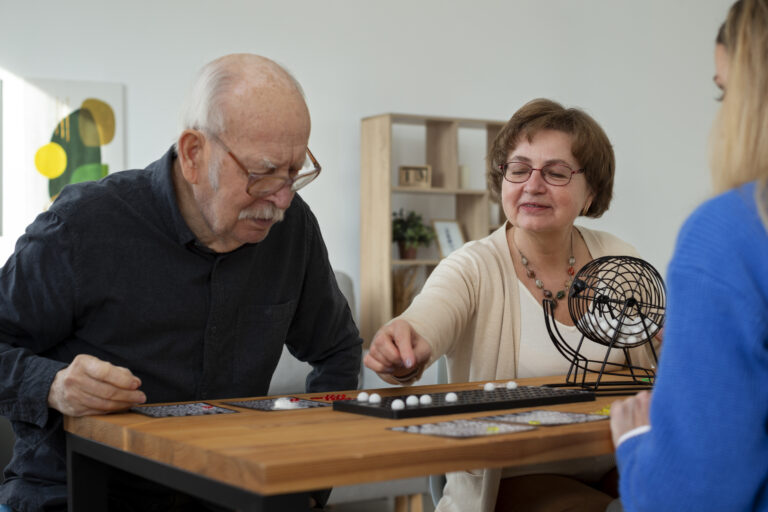Navigating Family Dynamics During the Holidays
Ever felt like you’re walking on eggshells at a family holiday dinner? You know, when Uncle Bob starts ranting about politics or Cousin Lisa brings up that embarrassing story from high school. If so, you’re not alone. Navigating Family Dynamics During the Holidays can be as challenging as steering a ship through stormy seas. But why should we let turbulent waters ruin our journey?
This post is your lifeline. It’s packed with practical strategies to deal with difficult family members and stressful situations during the holidays without losing your cool or sacrificing your mental health.
You’ll learn how effective communication techniques can smooth out conflicts and foster understanding among relatives. Navigating Family Dynamics During the Holidays becomes crucial, and we’ll also delve into setting boundaries and practicing self-care—because nothing says ‘Happy Holidays’ like maintaining sanity amidst chaos.
Are you gearing up for a smoother sail?
Table of Contents:
- Understanding Family Dynamics During the Holidays
- Effective Communication Strategies
- Setting Boundaries and Practicing Self-Care
- Strategies for Navigating Family Gatherings
- Techniques for Managing Stress and Conflict
- Building Stronger Family Relationships
- Seeking Professional Help and Support
- FAQs about Navigating Family Dynamics During the Holidays
- Conclusion
Understanding Family Dynamics During the Holidays
Holiday gatherings can stir up a whirlwind of emotions, with many people finding their stress levels rise, with 62% reporting elevated tension during this time, a phenomenon commonly known as holiday stress. It’s often due to navigating complicated family dynamics and handling difficult relatives.
The challenge is finding ways to foster peace while spending quality time together. Let’s explore how we can achieve that by understanding each other better and practicing patience at the dinner table.
The Challenge of Dealing with Difficult Family Members
It’s no secret – dealing with challenging relatives can be tough, especially when you’re trying to keep your cool amidst holiday stress. Remembering everyone has a unique point of view may help in these situations.
You might also need strategies for managing interactions with tricky family members or setting boundaries if things get too heated. Harvard Medical School offers some insightful tips on how our brains react under holiday pressure, which could guide us toward more effective responses.
Finding Common Ground
A shared past or mutual interests provide common ground that makes conversation flow easily and helps diffuse potential conflicts before they start. Make a mental note about what topics are safe and enjoyable for all involved, steering clear from subjects known to spark debate or discomfort.
Remembering why we celebrate holidays in the first place – love, gratitude, giving – brings perspective back into focus when tensions run high among loved ones.
Effective Communication Strategies
The holiday season is a busy time, filled with family gatherings and dinner table conversations. But what happens when the chat drifts towards controversial topics or unresolved issues? Here’s where effective communication comes into play.
Techniques for Resolving Conflicts
Finding common ground is key to improving communication within families during the holidays. Although it may be impossible to agree on everything, respecting each other’s opinions is essential for effective communication. The objective isn’t to emerge triumphant in a dispute; it’s about becoming more aware of one another.
To do this effectively, we can use some tried-and-true techniques like active listening and ‘I’ statements. Here are some more tips on how to engage in meaningful conversations.
Active listening involves giving your full attention to the speaker without interrupting them or preparing your response while they’re still talking. This approach lets them feel heard and valued – a crucial aspect of resolving conflicts.
‘I’ statements help express feelings without blaming others: “I feel [emotion] when you [behavior]” instead of “You make me feel…”. These sentences foster empathy rather than defensiveness – making discussions more productive and less heated.
Navigating family dynamics might be challenging at times due to past experiences or unmet expectations; however, remember that everyone has their struggles – just like us. Hence having patience during these interactions could potentially lead us closer towards finding that sweet spot called harmony.
Setting Boundaries and Practicing Self-Care
When it comes to handling the hustle and bustle of holiday gatherings, setting clear boundaries with family members is essential. How can we put this into practice? It’s all about expressing your needs clearly, honestly, and kindly. This might mean telling Aunt Susan that her well-meaning advice on your love life isn’t appreciated at the dinner table.
You see, establishing these boundaries not only reduces potential stressors during family interactions but also helps maintain a sense of control over one’s personal space and mental health. In fact, according to research on family relationships and well-being, such strategies are key for managing dynamics during festive seasons.
The Importance of Self-Compassion
Another powerful tool for navigating holiday drama is self-compassion. This means being kind to yourself when things get tough – yes even when Uncle Bob starts his political rants again. It involves acknowledging your feelings without judgment or criticism.
Incorporating simple acts into your routine can make a big difference: Take time out if you need it; breathe deeply; remember no gathering lasts forever.
This approach lets us handle difficult situations more calmly while keeping our sanity intact (we’ve all been there.). Plus studies show practicing self-care reduces stress levels considerably making holidays much more enjoyable – now who doesn’t want that?
Maintaining Mental Health During Gatherings
Festive periods often come with their fair share of challenges – some we anticipate others take us by surprise. That’s why preparing ourselves mentally before each event goes a long way toward preserving our peace of mind throughout the season.
Strategies for Navigating Family Gatherings
Hosting family events during the holiday season can be a challenge, especially when you’re trying to create a positive atmosphere amidst complicated family dynamics. Here are some tips that might help.
Making the Most of Family Time
Spend quality time with each other. Engage in activities everyone enjoys or start new traditions together. Games, storytelling sessions, cooking together – these shared experiences not only fill your home with laughter and joy but also give room for meaningful conversations and bonding.
Talk about interesting topics at the dinner table; they could be as simple as sharing highlights from the year gone by or discussing common interests like movies or books. Remember, though, to avoid hot-button issues that could trigger unnecessary drama.
If there’s an uncomfortable situation brewing between two family members, try diverting attention towards something light-hearted – like teasing Uncle Bob about his infamous turkey stuffing recipe. This strategy often helps diffuse tension and keep peace during gatherings.
Finding Common Ground
The key is understanding everyone’s point of view while maintaining respect for differences. Meaningful conversation takes patience and practice, but it’s worth every effort to navigate tricky family interactions smoothly.
Setting Clear Boundaries & Practicing Self-Care
Research shows setting clear boundaries during holidays greatly reduces stress levels. It’s okay to say no if you feel overwhelmed; it’s your holiday too.
Take some time to show yourself kindness and consideration. A little self-compassion goes a long way in managing stress and maintaining mental health during the busy season.
Dealing with Social Anxiety
Find supportive companions who empathize with your struggles. It is alright to prioritize your mental health above all else.
Techniques for Managing Stress and Conflict
With the holiday season comes joy, but it can also bring stress and conflict. It’s essential to know how to remain composed during tense circumstances, particularly when managing social uneasiness at family occasions.
One way to reduce stress is through taking slow, deep breaths. Breathing deeply can help reduce your heart rate and blood pressure, providing a feeling of serenity. This technique can be particularly useful when facing uncomfortable conversations or disagreements during holiday get-togethers.
A consistent meditation practice can also play an instrumental role in managing both stress levels and conflicts within families. According to research, daily meditation reduced aggressive behavior by 57% in one study group. It’s like adding a natural buffer between you and any potential family drama that might come your way.
Meditation as Your Secret Weapon Against Holiday Drama
Meditation not only helps reduce personal stress but also fosters better relationships with others through increased compassion – perfect for navigating those tricky family dynamics during the holidays.
Studies have shown that regular meditators exhibit higher levels of empathy towards others’ feelings – something we could all use more of around the dinner table this time of year. So next time Uncle Bob starts going off on his favorite rant about politics, just remember: breathe deeply…and maybe recommend he tries some mindfulness too.
Taking Time Out For You During The Holidays
Sometimes though, despite our best efforts, the stress of holiday family gatherings can feel overwhelming. When this happens, it’s essential to give yourself permission to take a step back and practice self-care.
Find a quiet corner or even go for a short walk outside if you need some time alone. Use that space not just to escape but also re-center with deep breathing exercises or meditation – remember what we said about its power earlier? Remember to maintain your mental health is as important as attending every holiday event.
Managing holiday stress and conflict starts with self-care techniques like deep breathing and meditation. These practices not only help you stay calm but also foster empathy for better relationships. But when the pressure gets too much, remember it’s okay to step back and take some time for yourself.
Building Stronger Family Relationships
Holidays can be a wonderful time for strengthening family bonds. To maximize the value of time spent with family, approach gatherings intentionally and with an open heart.
The foundation of strong relationships is often shared experiences and traditions. When families come together during the holiday season, establishing these rituals becomes even more essential. These could range from decorating the Christmas tree together to participating in a charity event as a team – whatever resonates with your clan.
A key element here is patience. Every family member brings their unique personality traits and perspectives to the dinner table which may not always align perfectly but are still worthy of respect. Grasping each individual’s outlook can be a major factor in creating tranquil relations.
Making Memories Together
Sometimes, creating memorable moments doesn’t need grand gestures or extravagant plans; it might just involve sitting around on comfy couches sharing stories or playing board games till late into the night. Such small acts often weave themselves into our hearts as cherished memories over time.
Finding common ground also plays an instrumental role when spending quality time with difficult family members who you don’t see eye-to-eye with all year round – this could mean setting aside political debates at least until dessert is served.
Celebrating Differences
In any gathering that involves extended family or old friends reuniting after years apart, there are bound to be differences in opinion & lifestyle choices. Embrace these variations rather than letting them divide you; remember what unites you as a family is much stronger than what sets you apart.
Practicing acceptance and kindness, particularly during the holiday season can help create an environment of love & respect. This doesn’t mean you need to suppress your feelings or opinions but rather express them in a considerate manner without letting things escalate into unnecessary drama.
Nurturing Bonds Beyond Holidays
Wrapping things up, remember that forging solid bonds is more than just holiday get-togethers. It’s a year-round endeavor involving consistent check-ins – be it through phone calls, video chats, or unexpected drop-ins. So, make sure to keep those relationships thriving.
Strengthen family bonds during the holidays by engaging in shared experiences and traditions. Be patient, respect differing perspectives, and cherish simple moments together. Find common ground with difficult relatives to avoid tension, embracing differences rather than letting them cause division. Practice kindness while expressing your feelings considerately. Lastly, nurture these relationships all year round for lasting connections.
Seeking Professional Help and Support
The holiday season can often be a time of stress, particularly when it comes to navigating family dynamics. It’s perfectly okay if you find yourself needing some extra help during this period.
If you’re feeling overwhelmed by difficult family members or stressful situations, consulting a family therapist might be the right move for you. Therapists are skilled in helping people manage relationship issues and could give valuable guidance on handling these tough interactions.
The Role of Professionals
A professional like a family therapist isn’t just there to listen – they can provide practical strategies too. These experts can guide you towards understanding different points of view within your family, reducing conflict at the dinner table during those big holiday gatherings.
In addition to seeking support from professionals, remember that friends and loved ones who aren’t directly involved in your family drama can also offer invaluable perspectives. Sometimes an outside viewpoint is all we need to navigate complicated dynamics more effectively.
Mental Health Matters Too.
We shouldn’t forget about our mental health while dealing with difficult circumstances either. Stress levels tend to spike during busy seasons like holidays which makes practicing self-care even more important than usual. Techniques such as deep breathing exercises or establishing a meditation practice could go a long way toward managing anxiety related to not only social scenarios but also extended family tensions.
Support Systems are Key
Finding supportive communities – online groups or local clubs focusing on similar experiences – is another excellent strategy for managing familial stressors over the holidays. Being able to share stories with others who understand what it’s like really helps lessen feelings of isolation common around this time of year.
Finally, remember to practice kindness towards yourself. Practicing kindness towards oneself can have a powerful influence on one’s mental well-being and overall holiday experience.
Dealing with family during the holidays doesn’t have to be an ordeal you dread every year. With professional guidance, supportive friends and loved ones, and some helpful strategies for managing stress in place, it’s possible to navigate even the most difficult family gatherings with grace and poise.
Seek Help, Understand Perspectives, and Prioritize Self-Care: Holidays can stir up stress in family dynamics. It’s fine to ask for help from a family therapist who can give you strategies for understanding different viewpoints within your clan. Friends or loved ones outside the drama might have fresh insights too. Don’t forget that self-care techniques like deep breathing or meditation are super important when it comes to managing these challenges.
FAQs about Navigating Family Dynamics During the Holidays
How do you deal with a dysfunctional family during holidays?
Focus on setting clear boundaries, reducing stress through self-care, and finding common ground. Remember, it’s okay to take time for yourself.
How do you deal with family tension at Christmas?
Maintain open communication and try to resolve conflicts calmly. Practice deep breathing or meditation if things get heated.
How do you deal with family drama during the holidays?
Avoid getting sucked into dramas by staying neutral. Foster understanding among members and opt for meaningful conversations instead of confrontations.
How do you deal with family you don’t like at Christmas?
Lay low when needed and keep interactions brief but polite. Try focusing on positive aspects of the gathering rather than negative ones.
Conclusion
Navigating family dynamics during the holidays can feel like walking a tightrope. But with the right resources, you can manage this! Remember, clear communication is key to resolving conflicts and fostering understanding among relatives. Keep your cool when Uncle Bob goes on his political rant or cousin Lisa brings up that high school mishap.
Never forget to set boundaries and practice self-care—your mental health matters most amidst holiday family drama and chaos. Be kind to yourself; it’s okay not to please everyone all the time.
If tensions arise, don’t be afraid to seek professional assistance or rely on your closest relationships for aid, even if it means exploring options like assisted living in Abilene. The goal isn’t perfection—it’s peace of mind and meaningful connections in whatever form they may take.






